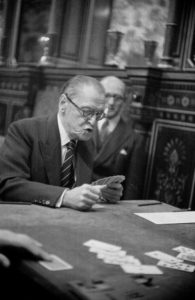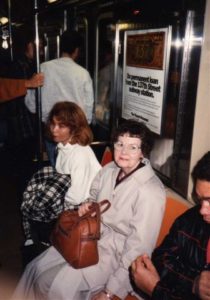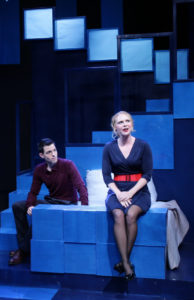Five things I wish I had:
 • A winter home on Florida’s Sanibel Island, preferably cloned from one of Frank Lloyd Wright’s Usonian houses or prefab designs—so long as it could be made hurricane-proof
• A winter home on Florida’s Sanibel Island, preferably cloned from one of Frank Lloyd Wright’s Usonian houses or prefab designs—so long as it could be made hurricane-proof
• A first-class player piano
• A private screening room
• A Morandi etching (you knew that one was coming, right?)
• A smallish motor home (or, alternatively but not preferably, a houseboat)
Five things I wish I could do:
• Speak French—though I’d happily settle for being able to read it with ease
• Sing really well
• Dance
 • Play bridge
• Play bridge
• Cook
Five things I wish I’d done, several of which are still possible:
• Visited the Grand Canyon
• Toured the Hermitage Museum
• Driven all the way from New York City to San Francisco—without an itinerary
• Had children
• Spent more time with my parents in their last years
 Five things I’m glad I did:
Five things I’m glad I did:
• Took my mother to the Metropolitan Museum of Art while she could still walk fairly easily
• Took a curtain call in front of a sold-out house at the Santa Fe Opera
• Said “Do you think you might possibly like to go to the ballet with me?” to Nancy LaMott on the night we met, a year and a half before she died
• Said “Let’s do lunch” to Our Girl in Chicago a quarter-century ago
• Married Mrs. T




 It came, as St. Paul told us it would, in the twinkling of an eye, and now we were all changed. Even as I slept, I had unknowingly acquired a new identity: I awoke to find myself a stranded man, unable to return to New York to share whatever its fate might be. Of course I had it easy, far more so than most of the thousands of other Americans who had been caught short on that bright Tuesday morning. Some of them were in the air, others in strange hotel rooms, but I was holed up with my mother in the small town where I had spent the first eighteen years of my life. My brother and his family lived just three blocks away. As exiles go, mine was to be both comforting and comfortable–and brief. But it was an exile all the same, and with every passing minute it grew harder to endure.
It came, as St. Paul told us it would, in the twinkling of an eye, and now we were all changed. Even as I slept, I had unknowingly acquired a new identity: I awoke to find myself a stranded man, unable to return to New York to share whatever its fate might be. Of course I had it easy, far more so than most of the thousands of other Americans who had been caught short on that bright Tuesday morning. Some of them were in the air, others in strange hotel rooms, but I was holed up with my mother in the small town where I had spent the first eighteen years of my life. My brother and his family lived just three blocks away. As exiles go, mine was to be both comforting and comfortable–and brief. But it was an exile all the same, and with every passing minute it grew harder to endure. The best thing that ever happened to Stephen Sondheim (other than being born a genius) was the advent of the scaled-down revivals that have made it possible in recent years for ambitious regional theater companies to mount his complex musicals without busting their budgets beyond hope of repair. Not only are they introducing his shows to a generation of viewers too young to have seen the original Broadway productions, but the best of them have changed the way that older viewers see those shows. No sooner do you strip away the big-budget trappings than it becomes evident that Mr. Sondheim’s musicals have far more in common with the hard-edged life studies of Edward Albee and Tennessee Williams than with “My Fair Lady” or “South Pacific.” To see the Lyric Stage Company of Boston’s small-scale revival of “Company,” directed with comprehensive understanding by Spiro Veloudos, is to come away with a much clearer sense of just how serious Sondheim and his collaborators are—and how unnervingly close to the emotional knuckle “Company” continues to cut 46 years after it was first seen on Broadway.
The best thing that ever happened to Stephen Sondheim (other than being born a genius) was the advent of the scaled-down revivals that have made it possible in recent years for ambitious regional theater companies to mount his complex musicals without busting their budgets beyond hope of repair. Not only are they introducing his shows to a generation of viewers too young to have seen the original Broadway productions, but the best of them have changed the way that older viewers see those shows. No sooner do you strip away the big-budget trappings than it becomes evident that Mr. Sondheim’s musicals have far more in common with the hard-edged life studies of Edward Albee and Tennessee Williams than with “My Fair Lady” or “South Pacific.” To see the Lyric Stage Company of Boston’s small-scale revival of “Company,” directed with comprehensive understanding by Spiro Veloudos, is to come away with a much clearer sense of just how serious Sondheim and his collaborators are—and how unnervingly close to the emotional knuckle “Company” continues to cut 46 years after it was first seen on Broadway.